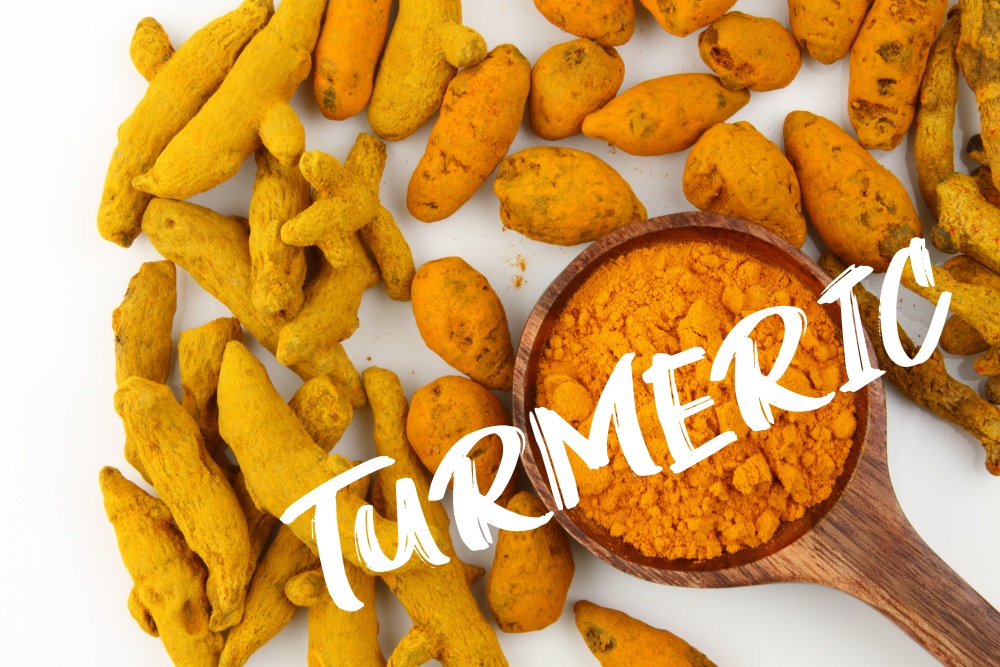There is a growing interest in people wanting to take control of their health and “longevity”. With this in mind, curiosity is growing surrounding the best “diet” for overall health and disease prevention. And of course, the jury is still out on whether or not there is a “perfect diet”. With that said, there is evidence that people who intake higher amounts of certain foods or spices, might have a small edge.
Turmeric, which starts out as curcumin, might have some health benefits. Therefore, in this article we will go through some of those potential health benefits and how to safely incorporate turmeric into your diet.
Types of Turmeric
Turmeric comes in many forms. Here’s a rundown of the most popular variants:
- Alleppey: 5% to 6.5% curcumin content
- Erode: 2.5% to 4.5% curcumin content
- Lakadong: 7% to 12% curcumin content
- Madras: Around 2% curcumin content
- Sangli: Up to 3.45% curcumin content
Health Benefits of Turmeric
The health benefits of turmeric or curcumin, the yellow pigment found in the spice, are a dime a dozen. Take a look at its top benefits:
Easing Depression
Low brain-derived neurotrophic factor (BDNF) is associated with depression.
If you have depression, taking curcumin could boost BDNF levels which has a small mount of evidence that this is linked to improved memory and learning. It may also increase the concentration of neurotransmitters like serotonin and dopamine, “happy hormones” that regulate mood, focus, and appetite.
According to a 2020 study, it inhibits the production of glutamate, in excitatory neurotransmitter, counteracting depression symptoms in a similar way as fluoxetine (Prozac) — an antidepressant.
Fighting Free Radicals
Curcumin can help prevent oxidative stress by eliminating different types of free radicals that cause cell damage and homeostatic disruption. It can also modulate the activity of glutathione peroxidase (GSH), and increase serum activities of other antioxidants, including superoxide dismutase (SOD) while battling oxidative stress.
Improving Memory
A 2018 research article showed the efficacy of a bioavailable form of curcumin on 40 subjects (ages 51–84). It showed improvements in learning, memory, and attention, likely brought on by a reduction in amyloid and tau accumulation in brain regions.
Improving Skin Health
Turmeric has anti-inflammatory, antibacterial, antifungal, and antimicrobial benefits. Hence, it may be beneficial for a variety of dermatologic diseases.
For example, a 2019 article showed its effectiveness in treating acne vulgaris. A gel infused with this spice has also been reported to improve the effects of photoaging. There’s also some evidence of oral curcumin being used for psoriasis, but further placebo-controlled studies are needed to support these findings.
Lowering the Risk of Heart Disease
Curcumin supplements can improve vascular endothelial function, which plays a significant role in regulating blood pressure and blood clotting.
Hence, it can be a promising nutraceutical in the prevention of cardiovascular diseases and reduce the risk of atherosclerosis development and progression. In fact, according to a 2012 study, it can even decrease the risk of heart attacks after coronary artery bypass grafting.
May Help Treat Rheumatoid Arthritis
Research in this area is limited, but a study conducted on humans reported curcumin could improve morning stiffness, walking time, and joint swelling.
Curcumin also has bone-protective mechanisms, making the plant beneficial in treating osteoporosis. This is backed by a pilot study that showed that the group who received curcumin had the highest percentage of improvement in overall Disease Activity Score (DAS) and American College of Rheumatology (ACR) scores.
Might Aid Cancer Prevention
Curcuminoids interfere with multiple cell signaling pathways, modulating cancer development and progression. A 2011 clinical trial reported a 40% reduction in aberrant crypt foci (ACF) in colorectal cancer that are believed to be precancerous lesions.
According to several studies, it can inhibit angiogenesis (growth of blood vessels that are associated with growth of cancer cells) and limit cancer cell metastasis, thereby reducing the risk of various malignant and benign cancers.
Preventing Eye Degeneration
Curcumin has neuroprotective properties so it can be an excellent therapy for the treatment of various eye diseases. This includes cataracts and glaucoma, eye conditions that damage the optic nerve and cause vision loss.
Treating Alzheimer’s
Turmeric can boost the levels of Brain-Derived Neurotrophic Factor (BDNF), a molecule that might have some association with the survival and growth of existing neurons.
As high levels of BDNF are associated with a lower risk of cognitive impairment, and curcumin can clear Abeta plaques — a neuropathological hallmark of Alzheimer’s, taking curcumin could lower the rate of cognitive decline in patients who have this disease. Of note, most of the evidence is in animal studies and report that further investigation is needed to confirm these findings
Treating or Preventing Diabetes
Curcumin can be used to prevent and treat diabetes, thanks to its positive effects on insulin resistance, hyperglycemia (high blood glucose), hyperlipidemia (high amounts of fatty substances in the blood), and islet apoptosis and necrosis.
However, most of these studies were conducted on animals, so its efficacy as a supplement should not be based on current research alone.
Uses of Turmeric: How To Consume This Ingredient
According to WHO, you need 1.4 mg of turmeric for every pound (0–3 mg per kg) of body weight, which should come to around one teaspoon a day.
There are many ways to incorporate it into your diet naturally, such as:
- Curry sauce
- Eggs
- Golden milk
- Grains
- Lentils
- Muffins
- Oatmeal
- Roasted veggies
- Scrambled eggs
- Smoothies
- Soups and stews
- Spice rubs or marinades
- Tea
Pro tip: Combine turmeric with black pepper. Black pepper contains “piperine,” which will improve the bioavailability of turmeric by 2,000%!
Turmeric as a Supplement
Curcumin has poor absorption, meaning not much of it reaches the body because compounds are broken down and eliminated quickly.
There is little evidence to support Turmeric supplements.
Conclusion
Turmeric can do wonders for your health, but it’s best to try and get your daily dose from food before turning to supplements.
Other Articles You Might Be Interested In:
Whispers to Wonders: Unraveling the allure of ASMR
You may have come across the term “ASMR” at least once, particularly if you’ve been on certain corners of social media. Be it TikTok, Instagram, or even YouTube, ASMR videos have been all the rage. Tapping, scratching, whispering, chewing—ASMR (autonomous sensory...
Mind Your Memory: Naturally Nurturing Your Cognitive Strength
Your memory is an intricate tapestry woven with knowledge, experience, and personal history, which forms the cornerstone of human cognition. However, as is the case with any tapestry, your memory will start to wear out with time, and your cognitive health may decline...
Tea-rific Health Benefits of Drinking Green Tea
Around 600,000 tonnes of green tea is consumed annually — a figure that has grown by approximately 20% in the last ten years. When you understand all the benefits of drinking green tea, its popularity isn’t surprising at all. This grassy, flowery, and earthy...
The power of protein on weight management
Weight management can be a challenging journey for many individuals, but with the right approach, achieving a healthy and sustainable weight is possible. Among the various factors that influence weight loss success, the role of protein cannot be overstated. Protein is...
Avocados: The Superfood that is SUPER good for you
Move aside, apples, because there's a new health-conscious favorite in town that's ready to steal the spotlight. Enter avocados, the green wonders that can humbly boast about their irresistible taste and creamy texture. But even more so about their health benefits....
Is a meat diet healthy?
The impact of meat consumption on health is a complex and debated topic. The vegans will give a compelling argument that meat will kill you. And of course, the “carnivore” (person who primarily eats meat) will give a compelling argument that meat is the healthiest of...
Unveiling the Health Secrets Within: Understanding the Gut Microbiome
The human body is home to trillions of microorganisms, forming a complex ecosystem within our gastrointestinal tract (GIT) known as the gut microbiome. Long overshadowed by the spotlight on human cells, this intricate community of bacteria, viruses, fungi, and other...
Exploring the Connection Between Cortisol, Stress, and Overall Health
The “Longevity” game is not about living long, but living “well”. And the hidden player calling the shots might be cortisol, aka the stress hormone. As stress permeates our lives, its effects on our overall health become increasingly apparent. In this article we will...
Polyphenols: Health Benefits and Food Sources
I have long believed that a diet of fruits, vegetables, and seeds had a positive impact on overall health. A great example are studies looking at people who eat a Mediterranean diet (diet with a high concentration of fruits, vegetables and legumes). The reason might...
Antioxidants: A beginners guide to understanding these powerful chemicals
Cardiovascular disease and cancer are responsible for 44% of deaths in the US. 6.2 million Americans are living with Alzheimer’s disease and nearly 1 million with Parkinson’s disease. All of these diseases have one thing in common, oxidative stress. But there is...











